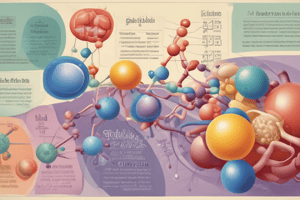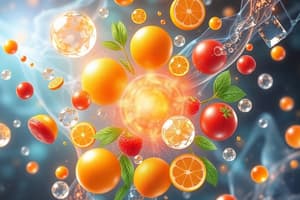Podcast
Questions and Answers
Which of the following is NOT a key function of pyridoxine (vitamin B6)?
Which of the following is NOT a key function of pyridoxine (vitamin B6)?
- Neurotransmitter production
- Regulation of gene expression (correct)
- Protein metabolism
- Hemoglobin synthesis
Which nutrient plays a critical role in energy metabolism and cellular function?
Which nutrient plays a critical role in energy metabolism and cellular function?
- Niacin (B3)
- Riboflavin (B2) (correct)
- Thiamine (B1)
- Pyridoxine (B6)
Which of these is NOT a rich source of niacin (vitamin B3)?
Which of these is NOT a rich source of niacin (vitamin B3)?
- Fish
- Legumes
- Bananas (correct)
- Meats
Which vitamin is essential for the maintenance of healthy skin and mucous membranes?
Which vitamin is essential for the maintenance of healthy skin and mucous membranes?
Which water-soluble vitamin is crucial for cognitive development and muscle coordination?
Which water-soluble vitamin is crucial for cognitive development and muscle coordination?
Which water-soluble vitamin is essential for resisting infections and supporting tissue repair?
Which water-soluble vitamin is essential for resisting infections and supporting tissue repair?
Which vitamin is essential for energy production and nerve function?
Which vitamin is essential for energy production and nerve function?
Which vitamin is known for its role in collagen formation and immune function?
Which vitamin is known for its role in collagen formation and immune function?
Which vitamin supports cell division and DNA integrity?
Which vitamin supports cell division and DNA integrity?
Which vitamin is crucial for the synthesis of cofactors and steroid hormones?
Which vitamin is crucial for the synthesis of cofactors and steroid hormones?
Which vitamin is involved in energy metabolism and fatty acid transport, promoting healthy hair, skin, and nails?
Which vitamin is involved in energy metabolism and fatty acid transport, promoting healthy hair, skin, and nails?
Which vitamin is found exclusively in animal-derived foods and is crucial for the production of red blood cells and DNA?
Which vitamin is found exclusively in animal-derived foods and is crucial for the production of red blood cells and DNA?
Flashcards are hidden until you start studying
Study Notes
Water Soluble Vitamins
In today's society, people increasingly rely on fast food and processed meals, which can lead to a lack of essential nutrients in their diet. Water-soluble vitamins play a significant role in preventing deficiencies and promoting optimal health. These vitamins, including members of the B-complex family and vitamin C, are vital components of a balanced diet. Understanding their importance, benefits, and food sources is key to maintaining a healthy lifestyle.
Pyridoxine (B6)
B6, or pyridoxine, is an essential nutrient involved in protein metabolism, hemoglobin synthesis, and neurotransmitter production. It contributes to cognitive development, muscle coordination, and the maintenance of healthy skin. Rich sources of B6 include poultry, fish, nuts, and bananas.
Riboflavin (B2)
Riboflavin, known as vitamin B2, plays a critical role in energy metabolism and cellular function. It supports tissue repair, resists infections, and maintains healthy skin and mucous membranes. Milk, eggs, almonds, and green leafy vegetables are excellent sources of riboflavin.
Niacin (B3)
Niacin, another member of the B-complex family, plays a crucial role in energy production, cell signaling, and gene expression regulation. It promotes cardiovascular and neurological health. Meats, fish, legumes, and nuts contain significant amounts of niacin.
Thiamine (B1)
Thiamine, or vitamin B1, is involved in various processes within the body, such as energy production and nerve function. It supports immune system balance and proper thyroid hormone secretion. Sources of thiamine include fortified cereals, whole grains, lean meats, and legumes.
Vitamin C
Vitamin C, also known as ascorbic acid, is a powerful antioxidant that aids in collagen formation, immune function, and wound healing. It also helps maintain healthy skin and mucous membranes. Citrus fruits, berries, melons, tomatoes, and leafy greens are rich in vitamin C.
Other Water-Soluble Vitamins
Other water-soluble vitamins include:
- Pantothenic Acid (B5): Important for the synthesis of cofactors and steroid hormones.
- Folate (B9): Supports cell division and DNA integrity, particularly in rapidly growing cells such as red blood cells.
- Biotic Acid (B7): Involved in energy metabolism and fatty acid transport, it promotes healthy hair, skin, and nails.
- Vitamin B12 (Cobalamin): Crucial for the production of red blood cells and DNA, vitamin B12 is found exclusively in animal-derived foods.
For optimal health, incorporating a wide range of whole foods in your diet ensures a sufficient intake of these essential vitamins. Taking excessive amounts of individual vitamins is generally unnecessary and could potentially lead to unintended consequences. Maintaining a balanced diet and consulting a healthcare professional can help determine appropriate vitamin supplementation if needed.
Studying That Suits You
Use AI to generate personalized quizzes and flashcards to suit your learning preferences.




